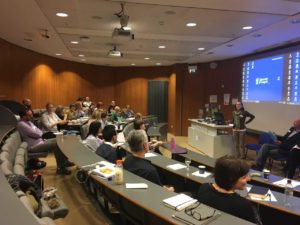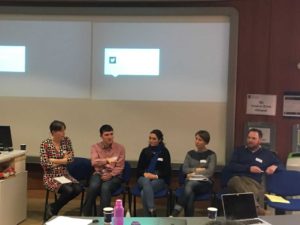By Charlotte Orr
On 17 April 2018, the Glasgow Medical Humanities Day took place at the University of Glasgow, organised by the Medical Humanities Research Centre (MHRC). After tea, coffee, and some delicious scones, the day began with an introduction from the MHRC Director Dr Gavin Miller and Co-Director Dr Megan Coyer. Both thanked relevant funding bodies and the College of Arts for their support of the event, before emphasising the purpose of the symposium: to showcase a cross-section of medical humanities research in Glasgow, and to network and build collaboration throughout all the universities and collections in Glasgow, with a view to creating further activities and events. Dr Coyer particularly highlighted the MHRC website, inviting the audience to become members, to keep up-to-date with medical humanities events with the blog, and to consider the website as a space that could eventually become a pan-Glasgow site.
The opening panel was entitled ‘Data Matters’. Dr Hannah-Louise Clark (History), the first speaker on this panel, presented insights into the history of healthcare and the state in colonial Algeria from 1800 to the present day. The next speaker was Dr Jo Halliday (Institute of Biodiversity, Animal Health & Comparative Medicine), who discussed the value of data in regard to her research into the social and ecological impacts of bacterial zoonotic diseases in northern Tanzania. In particular, Dr Halliday focused on the issues of data searching with inaccessible/unusable data that has been influenced by public health policy. The third speaker on the ‘Data Matters’ panel was Dr Craig Anderson (School of Mathematics and Statistics) who presented the challenges he faces with the mapping of disease in Glasgow. Dr Anderson identified current challenges with modern health data: statisticians attempting to identify high/low risk areas of disease are not given sufficiently detailed information as a result of patient confidentiality. The final speaker on the panel, Ms Michelle McGachie (Economic and Social History), presented a paper on the limits of data due to ethics, citing the expectations and limits that the law and society can impose on the use of health data. At the end of the panel, questions highlighted the strong cultural element in research on data throughout time and how these panellists came together to uncover the evolution of data research which will no doubt aid contemporary discussion.
The second panel ‘Curators as Agents of Research’ opened with a presentation from Dr Alistair Tough (Information Studies/NHSGGC), who spoke about the part he played in the digitisation of the Gartnavel Royal Hospital records and how he interpreted user feedback. The next speaker was Ms Julie Gardham (GU Special Collections), who wanted to enhance visibility of the collections by showcasing different projects that they have enabled, such as research on William Hunter’s library, and how these projects could further evolve. Ms Maggie Reilly (The Hunterian – Zoology Curator), was the third speaker. Ms Reilly brought to light the medical collections at the Hunterian and the Anatomy and Pathology Museum. Crucially, Ms Reilly highlighted the role of the curator in research projects: an individual who is capable of providing physical and intellectual access to collections, willing/able to participate in the research, and a source of technical support. Ms Alison Scott (Glasgow City Archives) was the fourth speaker of the panel: she presented on the public health records of Glasgow from the nineteenth century to today. Ms Scott identified three potential areas of interest in the health records: the fascinating Public Health Department’s Annual Reports from the end of the nineteenth century onwards, which evidence issues such as poor housing and infectious disease; publications of departmental staff (including thousands of monographs and articles); and information on cataloguing the burghs of Glasgow. Ms Scott also highlighted the ways she had conducted outreach to publicise these collections.
To get our stomachs’ rumbling before lunch, Dr Manon Mathias (French) presented a provocation entitled ‘What is the Stomach?’. Dr Mathias gave the audience three minutes to think of idioms and expressions to do with the stomach (‘to have butterflies in your stomach’, ‘to have the guts to perform a daunting task’) and encouraged us to think about what that tells us about our thoughts on that part of the body. Alongside a well-anticipated lunch, four tables of fascinating materials covering a wealth of research in medical humanities, both within and outwith the University of Glasgow, provided some metaphorical food-for-thought.
‘(Beyond) The Glasgow Effect’ was the subject of the third panel of the day. Ms Sarah Spence (English Literature) opened the panel presentations with a detailed chronology of the ways in which the term ‘the Glasgow effect’ has been utilised by journalists from a signifier of Glasgow’s thriving artistic culture, the city’s athletic achievements, to issues of poor health. Ms Spence concluded by suggesting that the mythology surrounding Glasgow seems wholly unique, despite whether the term is used positively or negatively. The second speaker of the panel was Dr Hannah Connelly (History/Archaeology), who presented her research on Scottish allotments. According to the presentation, only 19% of Scots eat five fruit/vegetables a day (Whoops!). While showing some striking images on the projector, Dr Connelly explored the history of the popularity/unpopularity of allotments, in order to suggest ways to encourage Scottish people to use allotments (and hopefully enjoy more veg!).
The penultimate panel of the day was ‘New Directions in End of Life Studies’. Mr Joe Wood (English Literature) opened the panel with a discussion of Cicely Saunders (1918-2005), in particular noting her theory of ‘Total Pain’. Mr Wood seeks to use the idea of ‘Total Pain’, hitherto only utilised in a medical context, and apply it more broadly as a narrative concept in his PhD research. Dr Nicole Baur (Interdisciplinary Studies) spoke next about new and exciting opportunities for doctoral and postdoctoral research in End of Life Studies, specifically around death and dying at Crichton Royal Hospital and Devon County Mental Hospital. Finally, Dr Marian Krawczyk (Interdisciplinary Studies/ Anthropology) gave the audience an overview of the studies being conducted at the Dumfries Campus with the End of Life Studies researchers.
The closing panel of the day focused on how PhD candidates, early career researchers, lecturers, and curators can contribute to the progression of medical humanities in Glasgow by soliciting thoughts and remarks from Ms Siobhan Convery (GU Library), Dr Gavin Miller (MHRC Director), Dr Angus Ferguson (GU Centre for the History of Medicine) and Dr Janet Greenlees (CSHHH Co-Director, GCU). Panelists emphasised the ways in which the expertise of their institutions could encourage further research. The panel also highlighted the need for a hub showcasing research and projects (perhaps the current MHRC website?), potential for more events encompassing many Glasgow institutions, and the wish to create a wider Scottish network (perhaps through a Scottish Medical Humanities Conference?). If the discussion from the last panel is any indication, I think we will be hearing a lot more from Glasgow Medical Humanities researchers in the near future!
Thank you to all the speakers: I am sure I can speak for the entire audience when I say that each of the papers was insightful and thought-provoking.





